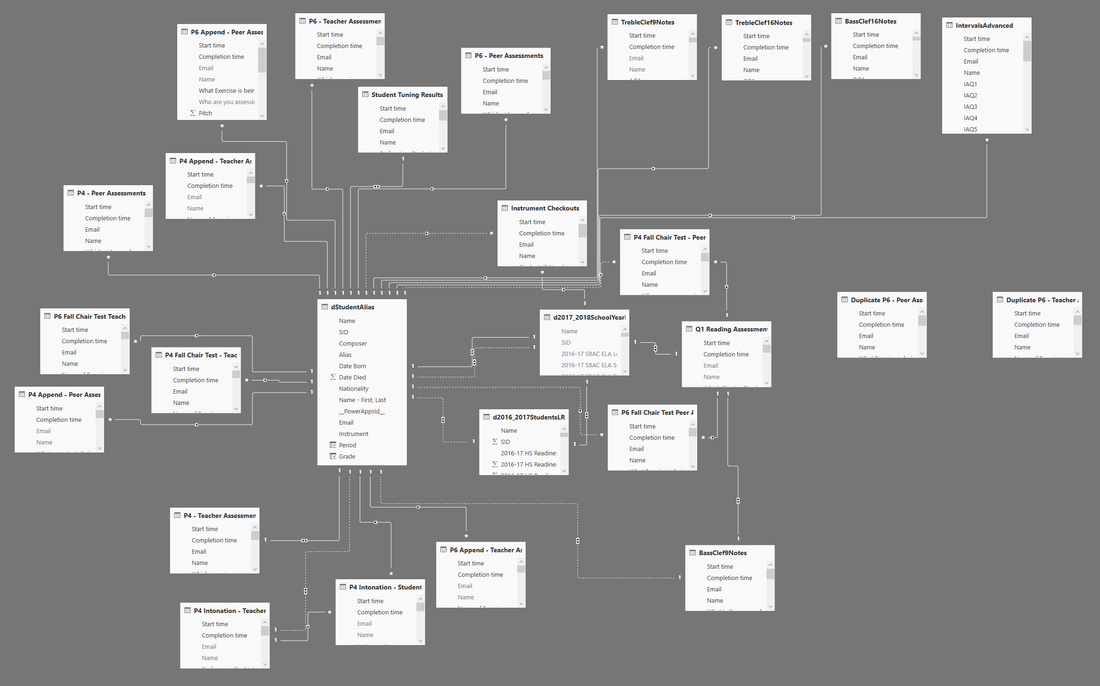Last week I attended my first out-of-state Ed Tech conference, NCCE in Seattle, where I presented a session on using Power Bi. This was my first time in Seattle, and even though it was a short two-day trip, I really enjoyed the city and the conference. I was able to meet up with some MIE colleagues that I hadn't seen in a few years and meet some new faces too.
This is the second time I've presented on Power Bi at a conference, and it still isn't any easier. Trying to explain what I do, how I do it, and why I do it in just 50 minutes to an audience that may not have any experience using a spreadsheet is a big challenge. I think what I'm doing is the coolest thing ever right now, but I get a sense that it can be a little overwhelming. Since this was my second go-around, I tweaked the session a little bit by eliminating the Excel demo. I've been using Power Bi for two years now, learning on my own, and there really is just too much info that can't be packed into a one-hour session. I try to keep all the info as relevant as possible; I provide examples of the data I'm tracking, how my data models are designed, basic workflows I use, and the ins and outs of sharing Bi reports with colleagues and students. The most important aspect is the "So What, Now What?", which I'm still in the process of learning myself. Learning everything I know about Power Bi, data management, and design has taken quite a while, but it's pointless if I'm not using it for its purpose; steering my curriculum and instruction into the right direction for my students.
I get a sense this is potentially important in the future for teachers. Now that I have access to all this information and insight I never had before about my students' learning, how do I properly use this information to my advantage with my instruction and classroom activities? I see this happening already, but it’s not the teachers making the adjustments, it's software doing the job instead. I see the value in using software to guide students with their work and learning, but I still think I can do a better job of explaining content, concepts, skills, and ideas to my students based on their individual needs. So how do I do this? I teach over 230 students a day. I have multiple sets of data now about their understanding of concepts, their abilities, their strengths, and their weaknesses. I now have an opportunity to specifically target my students' learning needs. So, how do I?
This is what I'm experiencing now. As Toni Townes-Whitley, the opening NCCE keynote speaker said in her keynote, "How do I digest this data?", and as I'm learning right now, how do I correctly act upon it? From my experience this year, it requires time. Time to think. Time to analyze the data charts, filter through the various subsets, and find the important insights hidden inside. I must make time to do this, and for me it needs to be as distraction free as possible. Not only do I need to do my analysis, but I need to capture those spontaneous ideas of how I can act upon what I now know about my students' learning and abilities. This is the second half of the challenge, the "Now What?". With the information I now know through my Power Bi data, I'm generating all sorts of ideas on how I'm going to target my students' needs. It's a lot though. In my head I'm rearranging seating charts, even considering mixing up my instrument sections so I have particular sets of students sitting next to each other. This isn't normal. In the music room, the instruments all sit together in their sections, but now I'm thinking of throwing that idea out the window. Other ideas include collaborative discussion activities, new instructional activities, just new…stuff. Ideas I've never considered. My pedagogy just went through a huge transition over the last five years, and now I feel like I'm about to go through another one. I don't mind this, I feel this is part of what makes my job enjoyable. I like to problem solve, and now I have more information on what problems I need to solve.
These specific pedagogical solutions to tackling my students' needs can't be designed and implemented via software. These actions currently require a teacher, but what about the data? How will that be handled in the future? Will teachers just rely on software to give them a generic analysis of their students' learning, or will they want to dig deeper? Will they want to know more? If they do, some new skill sets are going to be required. Teachers will need to know how to access various forms of student data. They'll need knowledge on creating data models that target specific insights of their students' learning. They're going to need some analysis skills and time to be creative afterwards.
It'll be interesting see if these thoughts ever become a real issue. The current focus has been on equity, understanding the cloud, why is the Wi-Fi slow, how to use cloud services like Office 365 and Gsuite, what's the latest new formative assessment tool this month, how do I sign in, why is the Wi-Fi still slow, etc. With all these new cloud services and formative, iterative, and summative assessment tools at our disposal to use (and being used), a lot of data is being gathered on our students' learning. What's all that data doing right now? Is it being used? Will it be used? Who's going to map it all out? Do they know how? Do they know what to look for?

 RSS Feed
RSS Feed
